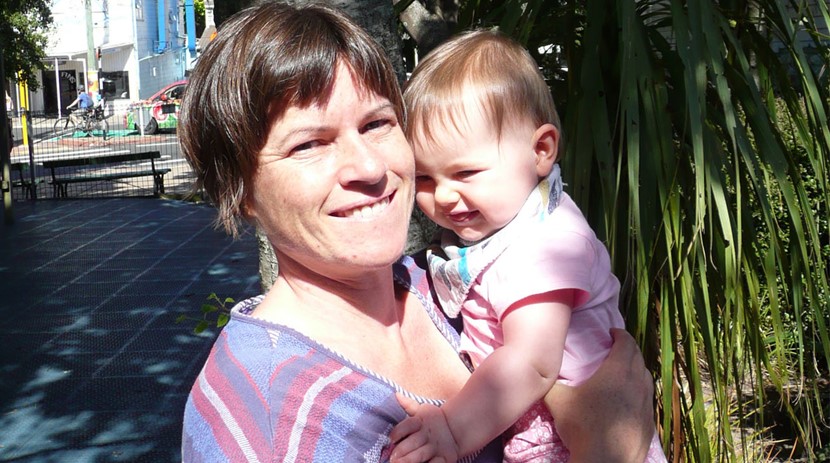Then and now: reflecting on parenting advice from 1946

Not long before Fiona Roberton and her husband Peter were due to have their first child, they went to the National Library in Wellington to view a book written by Peter’s late grandfather, Henry Roberton, who was a highly regarded Christchurch GP. The First Baby, published in 1946, is Henry Roberton’s book on antenatal care and caring for a baby in the early stages. Fiona and Peter understand it was also intended to be something of a rebuttal against the strict rules and prescriptive routines that were being promoted by Plunket at the time. Here Fiona reflects on this family treasure, and finds some timeless wisdom and encouragement amongst its pages.
Just recently Peter and I were sent our own copy of The First Baby by Peter’s uncle who had obtained it from a friend who owns a second hand bookshop. Since then I’ve been able to sit at home and savour its sage words of advice, many of which also bring a smile to my face. These include: “Pregnancy is a state of health, not a disease. It does not call for strange diets nor for strange behavior,” and “Breastfeeding is so much better than any other method that it is well worth while…The chief requirements are a light heart, a little leisure, and an easy and loving way with the baby”.
There is something about Henry Roberton’s authoritative yet kind words that still hold a lot of appeal. While some of the advice is based on the knowledge of the time – I don’t think, for example, his view that “total prohibition” of alcohol and tobacco in pregnancy and lactation is “hardly necessary” would go down well with medical specialists today – there is much that still holds true. I love the warmth behind a paragraph on timeliness of feeding, “Feeds should be reasonably punctual, but allowance must be made for mothers who wish to go to the pictures or enjoy other relaxation”. On the flipside he argues that there is no point in having a mother waiting outside the door while her baby cries in its room until it reaches a particular appointed time to feed them.
There are also references over which we can count our blessings today. In 1946 the suggested alternative to breast milk, if required, is boiled cow’s milk, which Henry Roberton admits to being indigestible in so many cases as to be unsuitable for routine use. We have certainly come a long way with the quality of infant formula that is now available, and indeed when I made the decision to introduce formula top ups I didn’t have to factor in the effects of the milk on my daughter’s digestive system.
When it comes to solids, there is no mention of purees. Rather, all kinds of interesting foods are recommended, including barley jelly or strained porridge as a first meal, and such options as junket, milk puddings, semolina, brains, tripe and Spanish cream from the age of seven months. It’s hard to imagine the Plunket solids cooking demonstration I attended featuring such foods, although I’m sure there would have been animated reactions if it had. The time involved in making such foods would also no doubt have been considerable.
The remainder of the book offers perspectives on teething, sleep, development, psychology, thumb sucking, clothes, heating and ventilation, rashes, constipation and epidemic diseases. A wonderful section titled “The Child Will Not Eat” suggests that variations in the quantity of food that babies eat are normal, and that coaxing a child to eat after it has had enough will only result in it wanting less at the next meal. I like that Henry Roberton recommends, as far as possible, giving the baby the food that the rest of the family is eating in order to be less disgusted when the baby refuses it.
In the process of reflecting on how times – and corresponding advice – has changed since 1946, there is something quite reassuring in knowing that, firstly there is much to learn as a first time parent and it was no easier to navigate the myriad of information available back then than it is today. Secondly, there is a theme that runs through “The First Baby” of care of the mother and old fashioned common sense that is quite refreshing having spent the past nine months of my daughter’s life listening to all kinds of advice on what to do and what not to do, and at times not knowing whose advice to follow. If someone had said to me, in the words Henry Roberton uses to close his book, that “it is best to follow well tried methods, but not to the point of absurdity, use common sense, and avoid fads”, it might have gone a long way.
Henry Roberton sadly passed away in 1991 and I have thought it would have been incredibly helpful having his wise head as we’ve handled the daily challenges of life with a new baby. The next best thing is having a copy of his book which helps me to picture him sitting in his doctor’s clinic checking babies and giving advice to their mothers with compassion and care.

